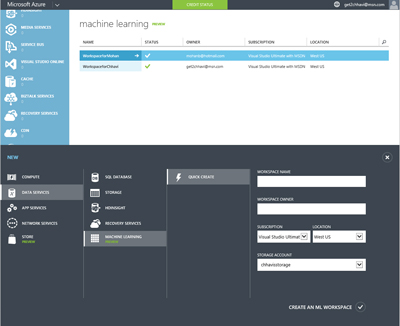News
With Azure ML, Microsoft Lowers the Barriers to Predictive Analytics
The cloud-based service would let partners deploy complex machine-learning models for their customers in a matter of hours, instead of months.
- By Gladys Rama
- August 27, 2014
With a public preview of Microsoft Azure Machine Learning (Azure ML), Redmond is giving partners an opportunity to explore a new avenue into the world of cloud-based Big Data services.
Azure ML, based on the Microsoft Azure public cloud platform, is the third and latest prong in Microsoft's strategy to make Big Data accessible to more customers, explained Herain Oberoi, director of product management in the Data Platform unit at Microsoft, in a recent interview. The other two prongs are SQL Server, with its data warehousing and business intelligence (BI) hooks, and the Microsoft partnership with Hortonworks and investment in Hadoop for Azure.
The goal of machine learning and of the "predictive analytics" market as a whole is to help users make predictions based on large amounts of historical data. While it isn't a new technology, the high-level skills required to program and deploy the solutions -- a process that could take many weeks or months -- has kept it from wider use. Azure ML is designed to remove this barrier, Oberoi said.
"Behind the scenes, [Azure ML] is a comprehensive, fully managed machine learning service, but it's coupled with the power of the cloud to really make the machine learning process and the ability to deploy machine learning models in production a whole lot simpler," he said.
 [Click on image for larger view.]
[Click on image for larger view.]
One way Azure ML does that is by providing a completely browser-based authoring environment that essentially lets users piece together the components of a machine learning solution without doing a lot of code. Azure ML doesn't promise to eliminate an organization's need for data scientists or a working knowledge of the underlying concepts of machine learning, Oberoi noted, but it does make the entire process of standing up a machine learning model much easier.
Though Azure ML is still relatively new -- the public preview was released at the Worldwide Partner Conference in July and Microsoft has not yet announced when it will become generally available -- the company already sees a significant opportunity for partners, particularly given the current high demand for data scientists in the market.
"Data science is an emerging skill set," Oberoi said. "If you look at any Fortune 500 company, they're now just starting to mature in terms of the hiring of data scientists and building that competency within those organizations."
The service would fit particularly well with Microsoft systems integrators looking to evolve advanced analytics businesses out of their existing BI practices, or ISVs and cloud software vendors that want to add machine learning to their current offerings, Oberoi added.
There's also an opportunity for partners to develop their own IP around the service. Microsoft plans to release a software development kit (SDK) when Azure ML hits general availability, Oberoi said, which would enable partners to "build specific modules within Azure ML and connectivity to data sources" that are geared toward solving very specific problems in various industries.
"A large portion of the success of this service...is going to depend on partners," Oberoi stated.
One partner that has been working with Azure ML since it was only available in a limited private preview is OSIsoft LLC, a managed Microsoft ISV. Using Azure ML and data gathered with PI System, its real-time data management solution, OSIsoft developed a system for Carnegie Mellon University that helped the school get a better handle on how buildings on campus were consuming energy and take steps to make it more energy efficient.
To help partners scale the learning curve of working with Azure ML, Microsoft has launched Azure ML University (MLU) on its Partner Marketing Center. Free for registered partners, Azure MLU is designed to be a self-service learning resource for partners, with information on best practices, tips and tricks, and more.
Prabal Acharyya, director of Microsoft Worldwide Partner Alliance at OSIsoft, said that from his experience, becoming competent with Azure ML should only be a matter of hours, provided the partner has a basic existing knowledge of Azure.
"I knew nothing about ML," Acharyya said. "It took me about four hours from start to finish to have a model running with the data." As a caveat, Acharyya noted that having ready access to the historical data -- in his case, via PI System -- helped.
"Now, if someone was non-technical...they might take a little bit of hand-holding, but it's a drag-and-drop, right-click type of infrastructure," he said. "So from that perspective, I wouldn't expect too much of a learning curve."
Related: